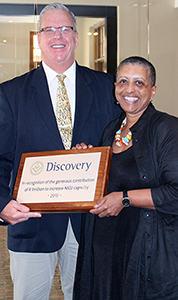Latest News Archive
Please select Category, Year, and then Month to display items
12 October 2020
|
Story Arina Engelbrecht
|
Photo Supplied
 Arina Engelbrecht from Organisational Development and Employee Well-being believes physical activity has a number of benefits for one’s health, including stress relief.
Arina Engelbrecht from Organisational Development and Employee Well-being believes physical activity has a number of benefits for one’s health, including stress relief.
Being physically active plays a big role in preventing the development of mental-health problems and in improving the quality of life of people experiencing mental-health problems.
Treatment for depression
Physical activity can be an alternative treatment for depression. It can be used as a stand-alone treatment or in combination with medication and/or psychological therapy. It promotes all kinds of changes in the brain, including neural growth, reduced inflammation, and new activity patterns are formed that promote feelings of calm and well-being. It releases endorphins – powerful chemicals in the brain that energise your spirit and make you feel good.
Physical activity can be very effective in relieving stress. Research in adults has found that physically active individuals tend to have lower stress levels compared to individuals who are less active. It also leads to improved sleep. When a person sleeps better and feels more rested, overall quality of life improves. They cope better with daily life stressors.
Reduce Alzheimer's risk
Regular physical activity can reduce your risk of developing Alzheimer's disease by up to 50%. It can also slow down further deterioration in those who have already started to develop cognitive problems. It stimulates the brain’s ability to maintain old connections as well as to make new ones.
A study asked people to rate their mood immediately after periods of physical activity (e.g. going for a walk/run, cycling, doing housework) and periods of inactivity (e.g. reading a book or watching television). Researchers found that participants felt more content, more awake, and calmer after being physically active compared to after periods of inactivity.
In conclusion, people who are physically active feel a sense of well-being, feel more energetic throughout the day, sleep better at night, have sharper memories, and feel more relaxed and positive about themselves and their lives.
“Being physically active not only changes your body, it changes your mind,
attitude, and your mood.” – Arina Engelbrecht
Neonatal Care Unit receives donation to expand capacity
2015-10-28
 With the best care and technology available,
the survival rate of premature
babies is about 85%. The neonatal intensive
care unit at the Universitas hospital can now
expand its capacity thanks to a donation of
R1 million by the Discovery fund.
From the left is Prof André Venter.
Head: Department of Paediatrics and
Child Health at the UFS, and mrs Ruth Lewin,
Head: Corporate Sustainability at Discovery.
|
The smallest people need the greatest care. This care is being provided by the neonatal unit in the Children’s Wing of the Universitas Hospital. This project of the University of the Free State (UFS), under the leadership of Prof Andre Venter, has led to several miracles regarding child health since its inception.
Now, thanks to a donation of R1 million rand from the Discovery fund, this unit can expand its capacity and treat more premature babies.
About 14% of babies in South Africa are born before the 37th week of pregnancy. These babies are born with a very low birth weight, and are in need of critical care. The neonatal intensive-care unit at Universitas Hospital is currently equipped to take care of about 14 premature babies at a time, from birth to discharge. However, because of the high incidence of premature births in the hospital’s service area, the unit needs about 45 beds.
The aim of the Children’s Wing Project is to expand the neonatal intensive-care unit in order to meet the demands of the hospital’s service area, which reaches as far as the Southern Cape. The Discovery Fund recently donated R1 million to the project, which will be used to expand the capacity of the neonatal intensive-care unit.
“With the best care and technology available, the survival rate of premature babies is about 85%. Without this, half of all premature babies would die,” says Prof Venter, Head: Department of Paediatrics and Child Health at the UFS.
“This is the reason why private and public partnerships, such as the one with Discovery, are essential to make specialised services available to the most vulnerable people. Discovery has made a significant contribution to the project without which we would not have been able to expand the capacity of the unit